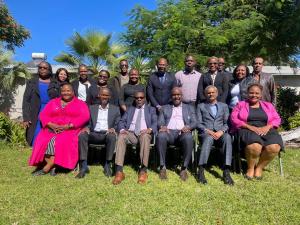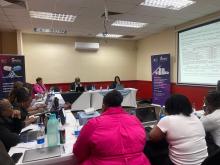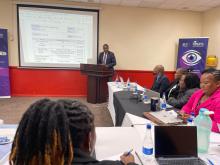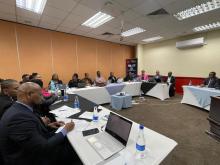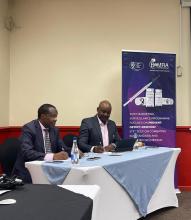AEFI committee strengthens Botswana’s vaccine safety surveillance
The Adverse Events Following Immunization (AEFI) Committee held a pivotal meeting from 19 to 22 May 2025 at Cresta Botsalo Hotel in Palapye. The session brought together 16 committee members alongside representatives from the Botswana Medicines Regulatory Authority (BOMRA), the Expanded Programme on Immunization (EPI), and the World Health Organization (WHO). The gathering focused on refresher training, onboarding new members, and conducting causality assessments of AEFI cases reported in 2024/2025.
In his opening remarks, AEFI Chairperson Dr. Kaone Pansirah Mabaka welcomed participants and emphasized the committee’s evolving role from managing COVID-19 vaccine issues to broader vaccine safety surveillance. He underscored the importance of training healthcare workers, resolving pending AEFI cases, improving public awareness, and enhancing the visibility of the committee’s work. Dr. Seima Dijeng commended the committee’s strides and highlighted the goal for BOMRA to achieve WHO Global Benchmarking Tool Maturity Level 3. He stressed the need for improved documentation, adoption of digital tools like VigiMobile, and proactive public engagement. WHO Representative Dr. Fabian Ndenzako praised Botswana’s AEFI system as a model in the region and encouraged open dialogue and data sharing. He also called for thorough preparation ahead of the national Measles-Rubella campaign planned for November 2025.
Led by Vice Chairperson Dr. Kesegofetse Chabaesele, the committee made several key recommendations to enhance its operations. These included providing branded visibility materials, supplying members with digital tools such as tablets, facilitating research opportunities and study tours, and promoting community feedback mechanisms. Further suggestions involved improving logistical arrangements for meetings, maintaining transparency in member recruitment, and recognizing members’ volunteer efforts through provision of sitting allowances. Strengthened collaboration with other child health committees and ongoing training for healthcare workers were also emphasized.
On 20 May, the WHO Representative visited health facilities across Palapye to better understand the district's health challenges. Facilitated by Deputy Council Secretary for Primary Health Care Dr. Tom Baaisi, the visit began with a courtesy call on Palapye Chief Ms. Martha Leban and district leadership. Chief Leban welcomed the delegation and emphasized the need to address health performance gaps in Palapye, which comprises 27 villages. Deputy Council Secretary for Development, Mr. Letswalo Moesi, provided insight into the recent upgrade of Palapye from a sub-district to a full district council and outlined challenges arising from the transition of Primary Health Care from the Ministry of Health to the Ministry of Local Government and Traditional Affairs. These included human resource shortages, inadequate financial resources, and poor ambulance fleet management. He expressed optimism that the new structure would eventually enhance healthcare delivery.
Dr. Ndenzako applauded the efforts made by local health officials and reiterated WHO’s commitment to supporting Botswana during the PHC transition and rollout of the National Health Insurance scheme. He noted that strengthening district health systems and building the capacity of health workers remain a top priority for WHO. He also shared that the Minister of Health was scheduled to meet with the WHO Director-General during the World Health Assembly to discuss Botswana’s roadmap towards Universal Health Coverage. The visit concluded with a tour of Palapye Primary Hospital, Lerala Clinic, and Goo-Sekgweng Health Post, where the team observed common challenges including shortage of ambulances, overcrowded facilities, limited medical supplies, and termite-infested infrastructure.
During the final two days of the meeting, the committee conducted causality assessments for seven reported AEFI cases. Three of the cases were classified as vaccine product-related reactions while four were deemed coincidental. One case was deferred due to insufficient information. Recommendations emerging from this session included revising the Child Welfare Clinic (CWC) register to capture detailed vaccine information, conducting refresher training for district-level AEFI committees, ensuring vaccine consignments are accompanied by information notes, and standardizing the use of auto-disabled syringes for routine immunizations.
Closing the meeting, Dr. Mabaka commended members for their dedication and active engagement, particularly the new members. He also acknowledged the secretariat’s commitment and thorough preparation for the meeting. The meeting reaffirmed the committee’s vital role in ensuring vaccine safety, strengthening public trust, and supporting Botswana’s national immunization goals.
The next AEFI Committee meeting is scheduled for July 2025.



